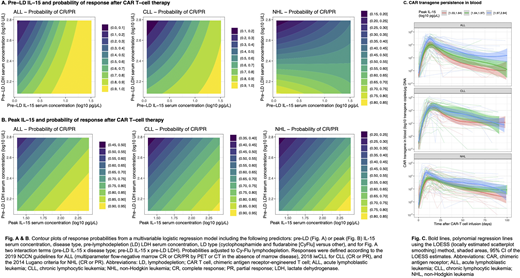Background:
CD19-targeted chimeric antigen receptor-engineered (CD19 CAR) T-cell therapy has shown significant efficacy for relapsed or refractory (R/R) B-cell malignancies, but lack of durable complete response (CR) is still seen in most patients. Enhancing in vivo T cell function or "fitness" is currently an area of intense focus to improve the anti-tumor efficacy of CAR T cell therapy. Supporting this notion, in vivo expansion and persistence of CAR T cells have been associated with better outcomes after CD19 CAR T cell therapy. Homeostatic cytokines, such as IL-15, play a key role in maintaining T cell fitness and formation of long-term immunologic memory. Since the impact of IL-15 on CAR T-cell function and anti-tumor efficacy in humans is not well characterized, we applied multivariable regression modeling to study the relationships between IL-15 serum concentrations, anti-tumor efficacy, and in vivo CAR T cell kinetics using data from 192 patients undergoing CD19 CAR T-cell therapy.
Methods:
We included patients enrolled on a phase I/II clinical trial (NCT01865617) at our institution who received defined-composition CD19 CAR T cell therapy. Responses were defined according to the 2019 NCCN guidelines for ALL (multiparameter flow-negative marrow CR or CR/PR by PET or CT in the absence of marrow disease), 2018 iwCLL for CLL (CR or PR), and the 2014 Lugano criteria for NHL (CR or PR). Logistic regression and proportional odds logistic regression were used for multivariable modeling of response and CAR T cell kinetics, respectively. In addition to the IL-15 serum concentration, all models included the following predictors: disease type, pre-lymphodepletion (LD) LDH serum concentration, and LD type (cyclophosphamide and fludarabine [CyFlu] versus other).
Results:
Sixty-four ALL (33%), 49 CLL (25%), and 79 NHL (42%) patients were included. Cyclophophamide and fludarabine-based LD was used in 163 patients (85%). We observed responses to CD19 CAR T cell therapy in 41 of 52 ALL (82%), 32 of 47 CLL (71%), and 38 of 75 NHL patients (54%). Models including pre-LD IL-15 identified interaction effects with disease type (p=0.008), and with pre-LD LDH (p=0.09). The impact of pre-LD IL-15 on response was differentially affected by the pre-LD LDH concentrations across disease types in a multivariable analysis including interaction terms (Fig. A). Adjusting for a pre-LDH value of 333U/L (third quartile), an increase in the pre-LD IL-15 concentration from 2.6 to 16.2pg/µL (1st to 3rd quartile) was associated with a 13.54, 5.61, and 1.33 increase in the odds of response in ALL, CLL, and NHL, respectively. We did not identify interaction effects when considering the day 0, and peak IL-15, or the IL-15 AUCpre-LD-30. Peak IL-15 was strongly associated with response (OR=4.46 per log10 pg/µL increment, p=0.02), with a larger effect size compared to day 0 IL-15 (OR=2.46, p=0.15), and the IL-15 AUCpre-LD-30 (OR=2.87, p=0.05). Higher peak IL-15 was associated with higher response probabilities across all diseases adjusting for the pre-LD LDH concentration (Fig. B). Next, we applied multivariable modeling to predict the CAR transgene AUC between day 0 and day 90 (AUC0-90). We confirmed that higher IL-15 serum concentrations were independently associated with higher CAR transgene AUC0-90; we found a stronger association between CAR transgene AUC0-90 and the peak IL-15 serum concentration (OR=4.71, p <0.001; univariate LOESS regression lines shown in Fig. B) compared to the pre-LD (OR=2.16, p=0.01), day 0 (OR=1.23, p=0.01) and IL-15 AUCpre-LD-30 (OR=2.59, p=0.02).
Conclusion:
Our multivariable analyses show that higher IL-15 serum concentrations are associated with higher probabilities of response and higher CAR transgene expansion and persistence. We estimated distinct relationships between the pre-LD IL-15 serum concentrations and response across disease types. More so in ALL and CLL patients than in NHL patients, high pre-LD IL-15 was associated with efficacy, even in those with high pre-LD LDH concentrations. This suggests that additional factors, such as the tumor microenvironment, might contribute to CAR T cell failure in some NHL patients. Peak IL-15 was independently associated with higher response probabilities across all diseases. Along with the known biological effects of IL-15 on T cell fitness, our findings suggest high levels of IL-15 could improve CD19 CAR T cell efficacy and in vivo persistence.
Gauthier:JMP, Eusapharma, Multerra Bio: Honoraria. Chou:Nektar Therapeutics: Patents & Royalties. Riddell:Lyell Immunopharma: Other: Founder; Adaptive Biotechnologies, Nohla: Membership on an entity's Board of Directors or advisory committees; Juno Therapeutics, A Celgene/BMS Company: Consultancy, Current equity holder in publicly-traded company. Maloney:Bioline Rx: Consultancy, Honoraria; Juno Therapeutics: Consultancy, Honoraria, Patents & Royalties: Patents are pending, but not issued, licensed, no royalties, no licensees., Research Funding; MorphoSys: Consultancy, Honoraria; Genentech: Consultancy, Honoraria; Amgen: Consultancy, Honoraria; Celgene: Consultancy, Honoraria, Research Funding; Kite, a Gilead Company: Consultancy, Honoraria, Research Funding; Pharmacyclics: Consultancy, Honoraria; Gilead Sciences: Consultancy, Honoraria; Novartis: Consultancy, Honoraria; A2 Biotherapeutics: Consultancy, Current equity holder in publicly-traded company, Honoraria. Turtle:Novartis: Consultancy; Humanigen: Consultancy; Kite/Gilead: Consultancy; Allogene: Consultancy; PACT Pharma: Consultancy; Physician Education Resource: Consultancy; AstraZeneca: Consultancy, Research Funding; Century Therapeutics: Honoraria, Membership on an entity's Board of Directors or advisory committees; T-CURX: Membership on an entity's Board of Directors or advisory committees; Myeloid Therapeutics: Current equity holder in private company, Honoraria, Membership on an entity's Board of Directors or advisory committees; Arsenal Bio: Current equity holder in private company, Honoraria, Membership on an entity's Board of Directors or advisory committees; Caribou Biosciences: Current equity holder in private company, Honoraria, Membership on an entity's Board of Directors or advisory committees; Juno/BMS: Patents & Royalties, Research Funding; Nektar Therapeutics: Consultancy, Research Funding; Precision Biosciences: Current equity holder in publicly-traded company, Honoraria, Membership on an entity's Board of Directors or advisory committees; Eureka Therapeutics: Current equity holder in private company, Membership on an entity's Board of Directors or advisory committees.
Author notes
Asterisk with author names denotes non-ASH members.


This feature is available to Subscribers Only
Sign In or Create an Account Close Modal